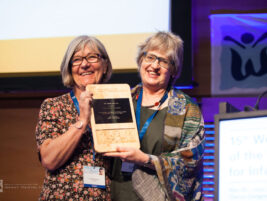In a recent paper, Minna Sorsa, Jari Kylmä and Terese Bondas report findings of their study that details the existing state-of-art regarding mothering and help-seeking.
A socio-cultural lens on mental health
Mental health and help-seeking are significantly determined by social and cultural factors. The question about the meaning of the social relationships or an individual’s opportunities to make informed choice are utterly different within the different global healthcare and social care system’s resources.
Perinatal psychological distress
The authors used the concept “perinatal psychological distress (PPD)” as an umbrella term for depression, distress and anxiety, during the time of pregnancy and the 1st year in a child’s life. Depression, stress or anxiety are experienced by 21%- 27% of the mothers (Obrochta, Chambers, & Bandoli 2020).
Socio-cultural help-seeking theories
Help-seeking theories conceptualize this period prior to accessing services as non-formal help-seeking from families, friends and network, as distinct from formal help-seeking in regard to officially funded and existing services (Rickwood & Thomas, 2012). Holly Hadfield and Anja Wittkowski found in their study of depressive mothers a stage of early help-seeking, when women seek informal support from friends, family, and the Internet; in this stage, women recognize that something is wrong, but they do not yet seek help (Hadfield & Wittkowski 2017). A challenge is that women may not seek help, even though perinatal services would have been developed and be available. Additionally, women may choose not to disclose their problems.
Help-seeking as a decision-making process: An existential phenomenology approach
Help-seeking viewed as a decision-making process emphasizes the assumption that people are active and goal-directed and that they fulfill instrumental purposes by seeking help from somebody, such as for specific mental health concerns (Rickwood & Thomas, 2012). On the contrary, the authors used an approach of existential phenomenology (the philosopher Lauri Rauhala, 1983), who posited that experiences are labeled according to the meaning given to specific situations within the individual life situation. Further, they used meta-synthesis originating in meta-ethnography, as developed by Noblit and Hare (1988), and they followed the eMERGe guidelines, which provide recommendations for conducting and reporting of meta-ethnography (France et al, 2019).
Contemplating help-seeking
By integrating and synthesizing knowledge of women’s experiences of contemplating seeking help for PPD the authors identified seven themes and a metaphor in a lines-of-argument synthesis, showing that contemplating help-seeking is a multidimensional phenomenon.
Women with PPD may not recognize an illness, perceive a need, name a disorder, or search for suitable care providers.
Women may not view their life situation as a barrier to care, but rather try to manage their life situation in the best possible way.
Women wanted to be sensitive toward their family members: this might lead to a lack of open discussion in the family or women not wanting to upset family members.
Given that women seem to want to protect their loved ones and are sensitive to critique, the authors write, that societal stigma around mental illness may be especially harmful. Shame and guilt of mental ill health can be formed by existing societal norms of being “supermoms”.
Therefore, it is essential to develop information and provide education for society around mental health-related questions and make such information available for women by pregnancy at the latest.
Mothers with PPD lacking shared experiences need an especially sensitive and appreciative manner of encouraging and enhancing reflection, possibly supporting the close relatives.
If the health care practioners (HCPs) recognize the phase of contemplating help-seeking, HCPs can address women’s concerns seriously prior to clients accessing services. Existing strategies and recommendations on perinatal mental health issues would benefit from the micro perspective, as women can only be helped by services if they themselves are willing to participate and share their lifeworld with those helping them in the services.
A clinical implication to improve practice, policy, and service user outcomes in health and other fields is that service providers should work with outreach and develop tools to connect with these mothers. Another suggestion is to improve training in mental health literacy prior to or during pregnancy. Also, the father perinatal distress should be considered of relevance, as the main actors within families are the loved ones. Identification of solutions at an earlier stage might improve the intake of formal support, since about half of the women experiencing PPD may not seek help without extra support.
Reflections
What does this mean for mothers with their babies, for babies and for the family of women in perinatal psychological distress?
How does this relate to the baby’s wellbeing, parent-child relationships, and the family context?
“Infant mental health” refers to how well a child develops socially and emotionally from birth to three (Zero to Three 2021). Infants grow in relationships with their carers. We know from research that perinatal psychological distress is associated with a number of poor outcomes for the mother, baby, and family. The parenting capacities, that may put infants at risk of adverse childhood experiences are experienced in everyday life situations within the family. Being very tired all the time, feeling overwhelmed by emotions and mood changes, such as dwelling in anxiety, being irritated, frustrated or angry may impact the way the mother connects with the new-born baby, and how pareting capacities can be used. As the eveyday caring environment has an impact on infant mental health, it is of vital importance that the families have support available.
Infant mental health is ideally formed in caring attachment relationships, perinatal psychological distress may challenge the formation of relationships. Help-seeking theories in mental health (Rickwood & Thomas, 2012) have revealed, that women may try to first solve their problems by themselves or with the help of family. The meta-synthesis showed, that seeking help from official sources may be the next best choice.
Yet, scientifically sound services with a family-centred and infant-centred approach may not have the outreach tools that these families could utilise. The suggestion is to develop earlier service forms, which may include wider ecosystems of care, mental health literacy and cultural questions.
New families with perinatal psychological distress may not recognize themselves being at risk, or being in need of help. This is something that care providers may not know. Therefore the early help-seeking phase is utterly important and brings a development need to outreach, early, preventive and even health promotion pursuit and strategies. In order to prevent and treat the mental health problems of very young children and their families, outreach development is needed, which requires scientific studies, and implementation of knowledge of the best existing practices of care.
Can the real stories of everyday life be used as basis of best practices?
The review questions based on the micro-level, the individual perspective, lift up new questions. Could and should the real stories of everyday life be used as basis of best practices? It could be an aspect of interest as it is a way to explore the baby connection with the wider relationship network in everyday life. From the help-seeking perspective the micro-level may mean that tiny instances within the service may be the reasons for the family interpretation of their formation of relationships with the services. An utterly sensitive and appreciative approach will be required by staff so that families would not drop out of care even before they start using services.
The women in the meta-synthesis experienced ambiguity, shame and guilt, and a contrast to ideals of family life. Maternal mental health intersects with infant mental health, which has implications for services. A phase of connections, of starting to work, of engagement within the services, may be required prior to clinical interventions that have been demonstrated to address attachment security in this context (such as Child-Parent Psychotherapy) taking place.
A challenge may be that services may have a focus either on parental psychological distress, or the well-being of babies, whereas a family-centred approach yields even more problematic questions. The promotion and protection of babies occurs in their primary relationships in their families. Therefore a system of care that pays attention to parental mental health needs, as well as the risks posed by failing to bring care to families who are struggling is warranted. A wider systems approach addressing babies’ needs for responsive and sensitive caregiving and secure relationships with primary caregivers is needed.
Challenges in the incorporation of best practices in the wider system of care, are formed by the intention to develop seamless practices. On the other hand, the comprehension of the steps the families take prior to accessing services are not well known. Developing these steps are supported by the aims of the requirements for the promotion of infant mental health:
“Dissemination of scientific knowledge about services for care, intervention and prevention of mental disorder, and impairment in infancy.”
“The dissemination of evidence-based knowledge about ways to support the developmental transition to parenthood, as well as the healthy aspects of parenting and caregiving environments.” (WAIMH, 2021)
These aims support taking into account multiple perspectives in strategic planning, incorporating the family insider viewpoint, and everyday life practices.
These findings matter to infant mental health – to babies in their primary relationship/s in their family.
Since families will try to solve their problems at an earlier stage, perhaps each person, who connects with the family enduring perinatal psychological distress is important and a possibility with hope? The service providers are one step away from the everyday life of families, and thus effort is required to close the gap, so that families, the babies, supporting and protecting their relationships with their mums, in their family setting would be helped at an earlier stage, already during the contemplation stage of help-seeking. In many countries a natural place to start closing the gap are the well-baby clinics and the time of pregnancy.
Finally, as the perinatal period is a unique time during women’s and infants’ lives, the results raise further questions. For example,
- How are women approached by professionals within health and social care services and programs?
- What are the attitudes of staff, and how would they become aware of those? How do service providers engage with families?
- What are the professionals’ sensitivity skills?
- How would such skills become the capacity of a wider health and social care service workforce?
Based on this research, I fully encourage infant mental health specialists to continue to rewrite the core skills to be used by any professional meeting with the families with perinatal psychological distress, so as to fully acknowledge families in their lived-experience of contemplating help seeking and to support them to engage in help-seeking as early as possible.
Review:
Contemplating Help-Seeking in Perinatal Psychological Distress—A Meta-Ethnography
By Minna Sorsa, Tampere, Finland, Jari Kylmä, Tampere University, Tampere, Finland, and Terese Bondas, University of Stavanger, Stavanger, Norway
Access the original article: https://www.mdpi.com/1660-4601/18/10/5226
References
France, E.F., Cunningham, M., Ring, N., Uny, I., Duncan, E.A.S., Jepson, R.G. et al. (2019). Improving reporting of meta-ethnography: The eMERGe reporting guidance. Bmc Medical Research Methodology, 19, doi:10.1186/s12874-018-0600-0.
Hadfield, H., & Wittkowski, A. (2017). Women’s Experiences of Seeking and Receiving Psychological and Psychosocial Interventions for Postpartum Depression: A Systematic Review and Thematic Synthesis of the Qualitative Literature. Journal of Midwifery & Womens Health, 62, 723–736, doi:10.1111/jmwh.12669.
Noblit, G., & Hare, R. (1988). Meta-Ethnography. London, United Kingdom: Sage Publications Inc.
Obrochta, C.A., Chambers, C., & Bandoli, G. (2020). Psychological distress in pregnancy and postpartum. Women Birth, 33, 583–591, doi:10.1016/j.wombi.2020.01.009.
Rauhala, L. (1983). Ihmiskäsitys ihmistyössä. Jyväskylä, Finland: Gaudeamus.
Rickwood, D., & Thomas, K. (2012). Conceptual measurement framework for help-seeking for mental health problems. Psychology research and behavior management, 5, 173–183, doi:10.2147/PRBM.S38707.
Authors
Sorsa, Minna, PhD, RN,
Tampere University Hospital, 33521 Tampere, Finland
Faculty of Social Sciences, Nursing Science, Tampere University, 33520 Tampere, Finland; minna.sorsa@tuni.fi







